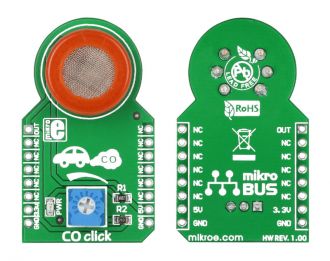
We strongly encourage users to use Package manager for sharing their code on Libstock website, because it boosts your efficiency and leaves the end user with no room for error. [more info]

Rating:
Author: MIKROE
Last Updated: 2019-01-29
Package Version: 1.0.0.1
mikroSDK Library: 1.0.0.0
Category: Gas
Downloaded: 7595 times
Followed by: 2 users
License: MIT license
This example demonstrates usage of the CO click board in mikroBUS form factor. This CO sensor is suitable for gas detecting equipment for Carbon Monoxide (CO). LCD shows PPM value of Carbon Monoxide (CO) concentration.
Do you want to subscribe in order to receive notifications regarding "CO click" changes.
Do you want to unsubscribe in order to stop receiving notifications regarding "CO click" changes.
Do you want to report abuse regarding "CO click".

Library Description
The library covers all the necessary functions to control CO Click board. CO click communicates with the target board via analog ( AN ) pin. This library contains drivers for read ADC value of MQ-7 sensor.
Key functions:
float co_voltageConversion( uint32_t adcValue, float vRef ) - Convert the voltage function.float co_getRatio( uint32_t adcValue, float vRef ) - Get the sensor ratio function.float co_getSensorResistance( uint32_t adcValue, float vRef ) - Get the sensor resistance.Examples description
The application is composed of the three sections :
void applicationTask()
{
valueADC = co_readADC();
Delay_100ms();
IntToStr( valueADC, logText );
mikrobus_logWrite( " ADC value: ", _LOG_TEXT );
mikrobus_logWrite( logText, _LOG_LINE );
mikrobus_logWrite( "-------------------", _LOG_LINE );
Delay_1sec();
}
Additional Functions :
void co_adcInit() - Function ADC initialization.uint32_t co_readADC() - Function read ADC value.Other mikroE Libraries used in the example:
Additional notes and information
Depending on the development board you are using, you may need USB UART click, USB UART 2 click or RS232 click to connect to your PC, for development systems with no UART to USB interface available on the board. The terminal available in all MikroElektronika compilers, or any other terminal application of your choice, can be used to read the message.